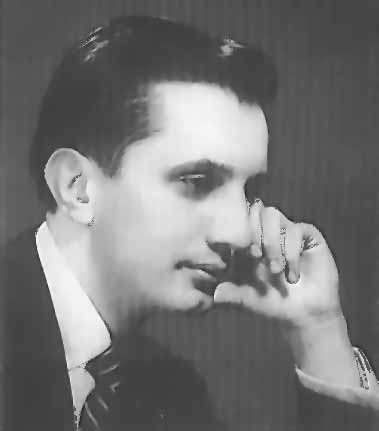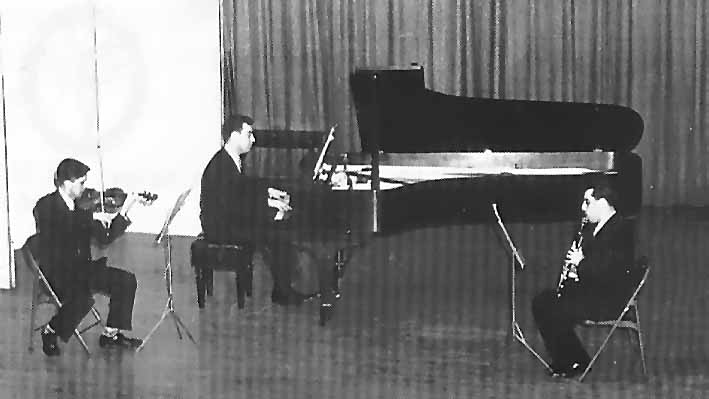|
|
CHRISTOS COSTANTAKOS
By Athan Karras
|
|
|
There has long been a universal desire among parents of young children to foster a love of music. To this end, young boys and girls are encouraged to take violin or piano lessons. In turn the long-suffering family has to contend with eerie sounds creeping from closed doors while the earnest young pupils struggle over the "etudes" in daily solo practice sessions in an attempt to master their magical instrument. Most children are soon distracted by a myriad of competing activities and interests, especially in today's "do it all" culture. Only a very small percentage will stick with a musical hobby long enough to become proficient, even less will follow music as a profession.
|
|
While his immigrant parents were making their way in Durham, North Carolina, Christos Costantakos was one of those rare young people who preferred to have a violin at his side wherever he went. After attending Central High School in Pennsylvania he thrust himself into a whirlwind of extended studies and artistic endeavors in the cultural Mecca of New York City. He earned a professional diploma in violin from the Brooklyn Conservatory of Music; a Bachelor of Arts degree in English from St. Francis College, a Master's degree in Educational Supervision and Administration from Pace University, and a Ph.D. in Music from New York University. Emulating the restless Greek hero, Odysseus, he also pursued intensive study at the Manhattan School of Music, the Mannes College of Music, and the Julliard School of Music.
All during this time, his violin was kept in tune and his artistry grew under the private training of various noteworthy instructors: violinist Jules Evan Baker, Theodore and Alice Pashkus, George Louis Ockner, Leona Flood, and Robert Geller. However, his most unique and outstanding training came under the baton of Dr. Demetrios Constantine Dounis. During this period Christos expanded his studies to chamber music, playing with Paul Doktor, William Knoll, and Fausto Esteves. Later he studied musical composition with Felix Deyo and Angelo Musolino. While he was earning one degree after another, his musical studies continued with Paul Emmerich, and added the study of Byzantine music with Aristides Anthis, Christos Vryonides, and Simon Karas in Greece.
|
|
In order to enliven his intense musical study, Christo developed a curious "dry sense of humor." His keen eye and sensitive perception would pick up on obscure incidents, which, to him, would be absolutely hilarious. At the Brooklyn Conservatory of Music, he would often sneak in to my dance classes and later, as he broke into incontrollable laughter, he would clown around mimicking the novice students' missteps. We often jested about serious events as Christo had the ability to perceive the funny side of everything.
|
|
All this joking around would suddenly be terminated when he raised his right arm and extended his bow preparing to swing into the first note on his solo violin. He would be transformed into a totally differen person without a hint of comedic expression. Afterward, he returned to his own basic reality jesting and responding to situations that he found to be positively hysterical. I learned from my friend Chisto the value of humor as I laughed along with him when we worked on projects together.
It was evident that the young boy from Durham, North Carolina was never distracted by anything but music and he went on to participate in a wide range of musical events in the New York area. He also developed an interest in the music associated with the Greek Orthodox Church and began working with the choir at Three Hierarchs in Brooklyn, New York. In addition, Christos began his longtime relationship with the Brooklyn Conservatory of Music, still found time to perform with the Scranton Philharmonic, went on tour with Oscar Strauss and Sigmund Romberg, and played violin under such colorful conductors as David Mendozza, Bob Stanley, Walter Hendl, George Sebastian, and one of his mentors Christos Vryonides.
His dedication to music caused him to dig deeper into his roots by looking for ways to make church music much more meaningful to the congregation. He immersed himself in editing and translating the Byzantine Chant of the Greek Orthodox Church by Christos Vryonides from Greek to English. The important relationship between secular and liturgical Greek music motivated him to head up the Orpheus Chorus of Brooklyn, New York, which offers con-certs in both these idioms.
While trying to find suitable music to meet the demands of the Greek chorus for an Off-Broadway production of Sophocles' Oedipus translated by the eminent poet Constantine Trypanis, I was honored to work with Christos. Seizing upon the idea that the choruses of ancient Greek tragedies were sung and danced, Christos created an original score emulating the Grecian ideals espoused in productions for the ancient theaters of Epidaurus. Chistos' compositions are largely inspired by folk and contemporary Greek music bringing them together in the realm of chamber orchestras and choral renditions. His recorded compositions have been published by Chappell Music, NYC
Of special note is an exemplary book by Chris Costantakos about his teacher and mentor titled Demetrios Constantine Dounis: His Method in Teaching the Violin. This book has been hailed as a "tho-ough evaluation and a fascinating personal history -a must for every string player and teacher." -George Neikrug, Boston University. "This is indeed an excellent book. . .Dr. Dounis had one of the most fertile minds, and when applied to violin playing, conceived the most original and practical exercise of a clarity of analysis beyond anything that preceded him. In reading this book, I realized more than ever how much his thoughts had influenced my own." -Yehudi Menuhin. "This work is an exemplary dedication to a great teacher and innovator in helping and guiding future students of any string instrument. Dr. Dounis was one of the most influential violin pedagogues of the twentieth century. This book is an in-depth study of Dounis' work and his art. The teacher of many of the great string players of our time, Dounis imparted to his students an organized and unified approach to violin technique." -Peter Lang Publishing.
In following suit with the study of the violin, Christo felt compelled to co-author another work based on the teachings of D.C. Dounis called The Technical and Interpretive Problems of the 24 Paganini Caprices. In addition to writing, composing, and directing, Christos Costantakos has taught violin, Theory, Form and Analysis, Harmony at the Brooklyn Conservatory of Music and in his private studio.
Christos Costantakos is one of those rare individuals who was able to develop his childhood gift of music nurtured by his Greek immigrant parents into a lifelong exploration of the art of music, the joy of the violin, secular and religious compositions and arrangements, performing, lecturing and teaching, directing and writing; all with a quiet gentlemanly demeanor and a touch of humor. He lives in Brooklyn, New York with his wife Chryssie not far from his two adult daughters.
|
HCS readers may wish to view other articles and releases in our permanent, extensive archives at the URL http://www.helleniccomserve.com/contents.html, especially in our sections on Greek music and arts.
|
|
|
|
2000 © Hellenic Communication Service, L.L.C. All Rights Reserved.
http://www.HellenicComServe.com
|



